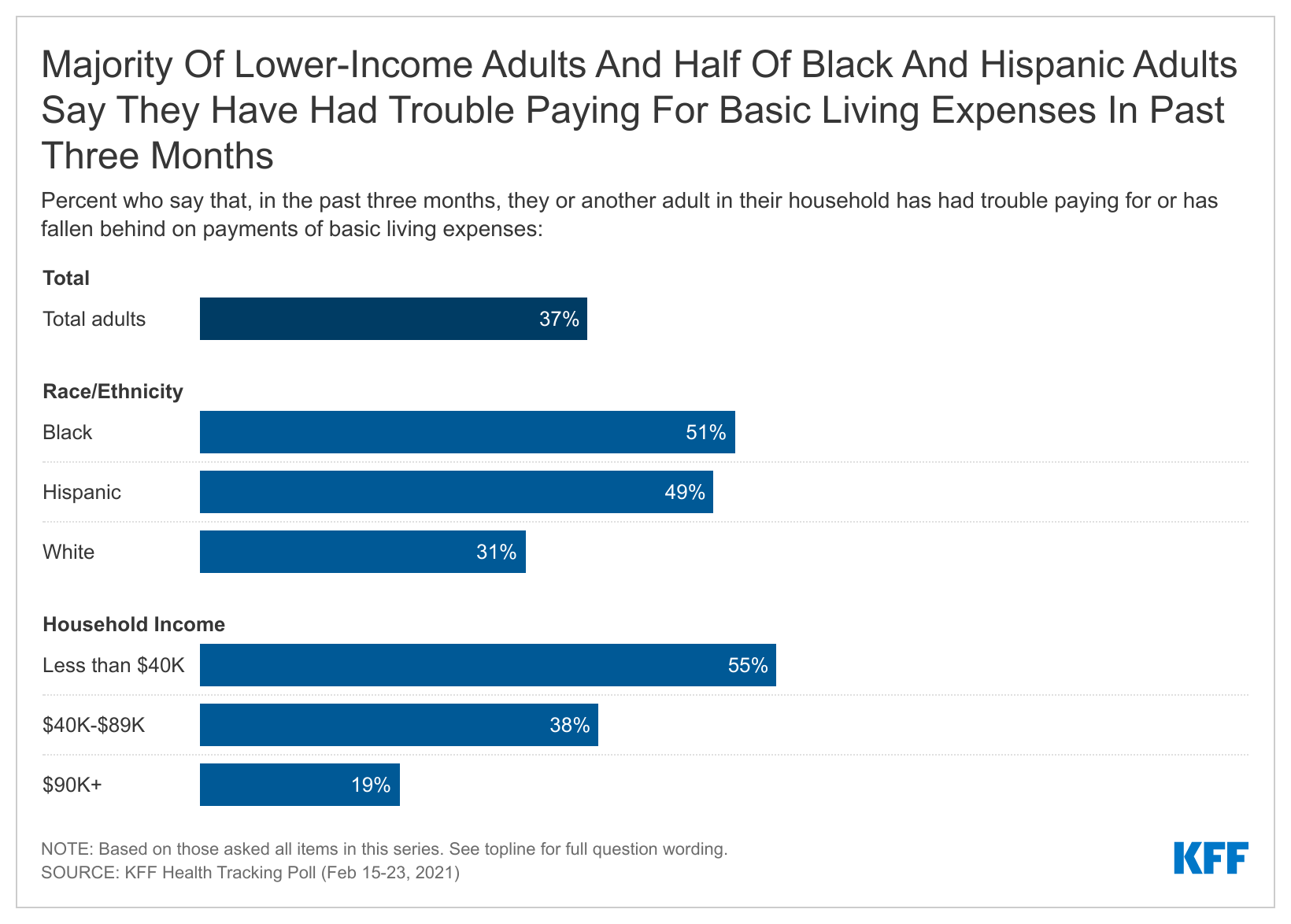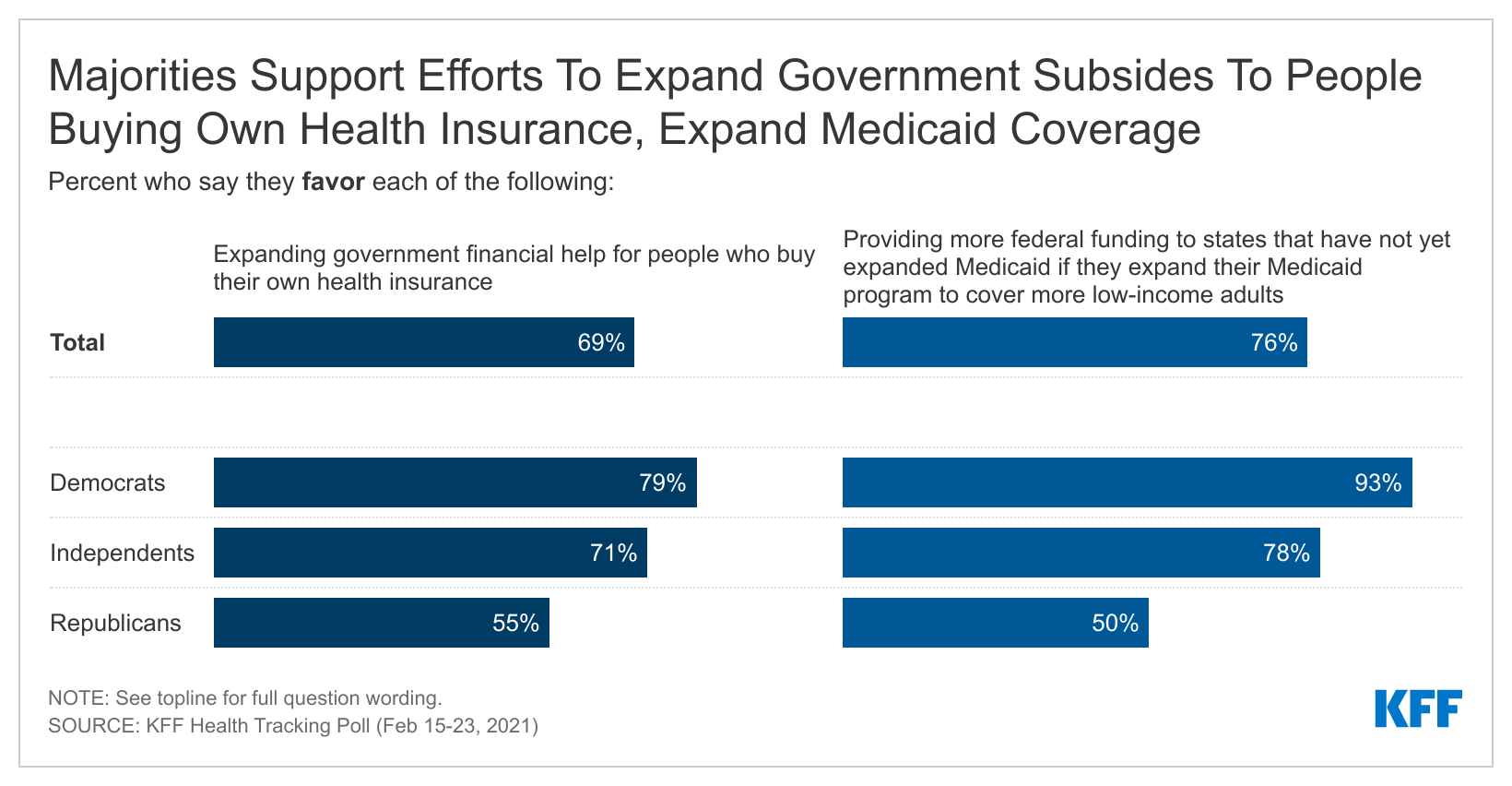
The independent source for health policy research, polling, and news.
KFF Tracking Poll: More Than a Third of Americans Say They’ve Struggled to Pay Living Expenses Since December; 6 in 10 Families Hit by COVID Have Lost A Job or Income
As Congress Weighs New $1.9 Trillion COVID-19 Relief Plan, 3 in 4 Across Partisan Lines Say Congress Isn’t Doing Enough to Help People Who Lost Jobs or Income Due to the Pandemic
Majorities Favor Provisions to Expand Marketplace Tax Credits and Encourage States to Expand Medicaid
As Congress considers an additional $1.9 trillion COVID-19 relief plan, more than a third (37%) of Americans say that someone in their household has had trouble paying basic living expenses over the past three months, the latest KFF Health Tracking Poll finds.
This includes nearly 1 in 4 (23%) who say they have fallen behind on their credit card bills, and 1 in 6 who say they have had trouble paying for food (17%) or who have fallen behind on their rent or mortgage (16%). Similar shares say they have had trouble affording health care including paying medical bills (16%) or affording health insurance coverage (16%). More than half (55%) of households with annual incomes less than $40,000 report recent financial struggles, as do about half of Black (51%) and Hispanic (49%) households.
These financial struggles come more than a year into the pandemic and reflect the pandemic’s impact on people’s incomes. Overall, 44% of adults say someone in their household lost a job or income since last February due to the pandemic, including more than half of adults under age 50, and at least half of Black and Hispanic households.
Families directly affected by COVID-19 were especially hard hit, with 61% of households with a COVID-19 diagnosis saying they lost a job or income due to the pandemic, compared to 41% of households in which no one tested positive.
“The COVID pandemic has hit many Americans hard financially, but the impact can be doubly cruel when someone in the family gets COVID and suffers economically at the same time,” KFF CEO Drew Altman said.
The poll finds broad bipartisan agreement that Congress is not doing enough to help people who lost a job or income due to the pandemic. About three quarters (73%) of the public, including similar shares of Democrats (74%), independents (73%) and Republicans (79%) say Congress isn’t doing enough. Much smaller shares say Congress is doing about the right amount (18%) or doing too much (6%).
Partisan divisions emerge in their assessment of President Biden’s efforts to help people who lost jobs or income due to the pandemic. Republicans overwhelming say he is not doing enough (71%), while Democrats overwhelming say he is doing the right amount (66%). Independents are more divided, with nearly half (48%) saying not enough and more than a third (37%) saying about the right amount.
Most (62%) of the public approve of President Biden’s handling of the pandemic, twice the share who disapprove (30%), though with big partisan divisions. Nearly all Democrats (92%) and most independents (60%) approve of President Biden’s pandemic performance, while most Republicans (69%) disapprove.
The poll also finds broad support for two provisions in the House COVID-19 bill aimed at making health coverage more affordable by expanding tax credits available to people who buy their own health insurance through the Affordable Care Act’s marketplaces and by providing a financial incentive for states who have not expanded their Medicaid programs to cover more low-income adults to do so.
Expanding marketplace subsidies is favored by 69% of the public, including a small majority of Republicans (55%), while providing financial incentives for states to expand Medicaid is favored by three quarters (76%) of the public, including most Democrats (93%), more than three-fourths of independents (78%), and half of Republicans.
Most people continue to view the Affordable Care Act favorably (54%), while 39% view it unfavorably.
When asked what the Biden administration and Congress should do next about the 2010 law, half (49%) want them to build on what the law does, and another 13% want them to keep the law as is. Fewer want the Biden administration and Congress to scale back the law (8%) or repeal the law altogether (23%).
Partisans differ on these approaches, with three in four Democrats wanting the Biden administration and Congress to build on what the law does (77%), while two-thirds of Republicans want the law to be scaled back (16%) or repealed entirely (51%).
Designed and analyzed by public opinion researchers at KFF, the KFF Health Tracking Poll was conducted from February 15-23 among a nationally representative random digit dial telephone sample of 1,874 adults, including oversamples of adults who are Black (507) or Hispanic (506). Interviews were conducted in English and Spanish by landline (339) and cell phone (1,535). The margin of sampling error is plus or minus 3 percentage points for the full sample. For results based on subgroups, the margin of sampling error may be higher.

